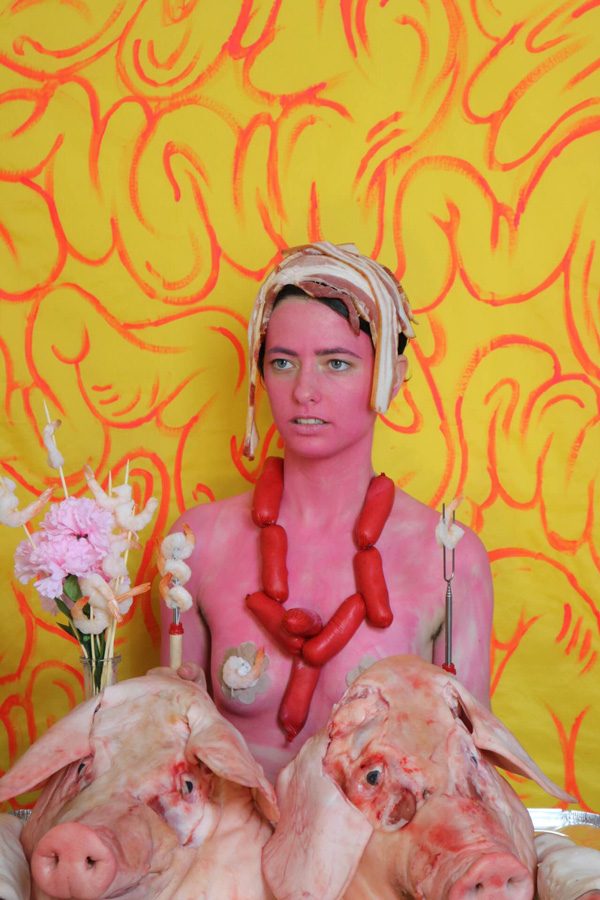Recent Northwestern graduates break into Chicago comedy scene
Sarah Sherman
October 19, 2016
A&E
For recent graduate Sarah Sherman, leaving Northwestern was what finally liberated her comedy.
Sherman currently participates in a monthly stand-up show she created, “Helltrap Nightmare,” which is held at The Hideout, an independent comedy and music venue in Chicago. And after just a year as a full-time stand-up comedian, she was voted the best stand-up comic in the Chicago area by the Chicago Reader.
Sherman’s comedy is hyperactive and profane, oftentimes breaking the fourth wall and addressing the audience as if she would her friends.
Sherman said the themes she explores in the performances often involve body image, which she highlights via the use of visual art components.
“What I found out starting do stand-up is there aren’t a lot of female identifying stand-ups, and there is not a lot of minority stand-ups on large enough platforms,” Sherman said. “I have used stand-up to explore my own problems being a woman … I have grown up with society telling me that my body is a certain way.”
Sherman said Chicago turned out to be a supportive community for the type of work she wants to do, but this type of creative freedom was not as available for her in the NU comedy scene.
“Overall, the kind of energy of the school wasn’t very compatible with mine,” she said. “I felt like maybe my voice didn’t fit in … I didn’t know what I was capable of at Northwestern. There’s a lot of grime and gore in my (work) that isn’t totally in the Northwestern aesthetic.”
Sherman said Chicago gives comedians room to explore their craft in a way that cities like New York and Los Angeles, where the population of striving comedians is larger, cannot.
Sherman still considers her recognition by the Chicago Reader an “unrealistic title” based on how new she is to the scene, but she said she is working hard to certify it, trying to find a balance between writing, performing and taking time for herself.
“For a while, I had a show mostly every night,” Sherman said. “I learned the hard way that you don’t get to write when you’re doing that.”
At “Helltrap Nightmare,” Sherman performs stand-up by herself, but also aims to incorporate some of her friends, like fellow comedian Wyatt Fair (Communication ‘15), whom she called one of the “funniest people on earth.”
Fair, one of Sherman’s closest friends from Northwestern, is also trying to break into the Chicago comedy scene. Although he does not see Chicago as a gateway into the mainstream comedy scene, he said everyone working in the city is essentially taking their “first step” in the genre.
“There’s a little bit more freedom in Chicago,” Fair said. “There is such a huge independent comedy scene here … but it’s not as if these people are going to put you on a sitcom.”
Fair added although attending and performing at different open mic nights helped introduce him to the comedy scene in Chicago, he has become more interested in writing sketches and performing improv.
Like Fair, fellow stand-up comedian David Brown (Communication ‘16) said he also regularly attends open mic nights, where he sees a lot of other people trying to do the exact same thing he’s trying to do. Brown said it’s important that the Chicago comedy scene is developing new, young talent.
“While that’s the biggest problem, it’s also an asset in that people will give you information,” Brown said. “People will (tell you about) the shows that they’re doing, or things that they’re working on. It’s kind of a like a little mini college experience in that way.”
Brown said Chicago is also generally cheaper than living in bigger entertainment hubs such as New York City or Los Angeles.
However, many people eventually move out there to pursue greater opportunities and more acting-based gigs, Fair said. He said Chicago does not restrict him to fit into any sort of mold, allowing him to work just for the “sake of his own craft.”
“A lot of people use (Chicago) to try random stuff and get their legs under them and meet other people trying to do the same thing,” Brown said. “I’ve really found that to be true.”
Comedy is an essential part of a city’s entertainment industry because people get to take a break away from their daily routines. Fair said being provocative or saying unexpected lines becomes part of the experience for the audience, who question what will happen next.
“By freaking people out, we’re bringing them adrenaline, this sort of roller coaster feel,” Fair said. “No one actually knows what’s gonna happen next. Making people laugh is of course the goal.”
Email: [email protected]
Twitter: @jenniferhepp97


